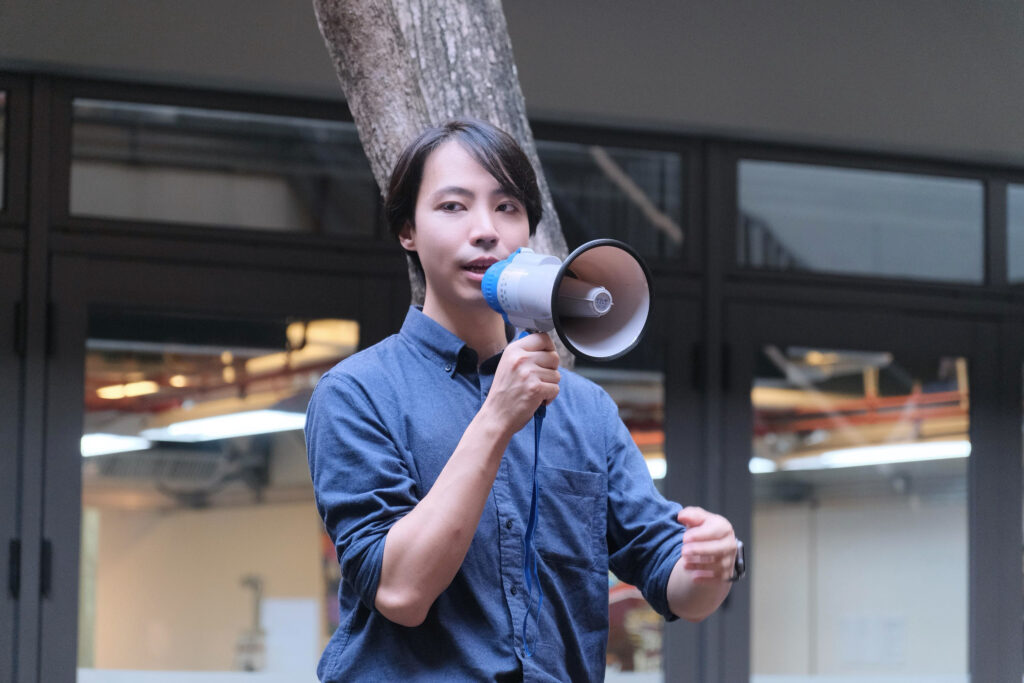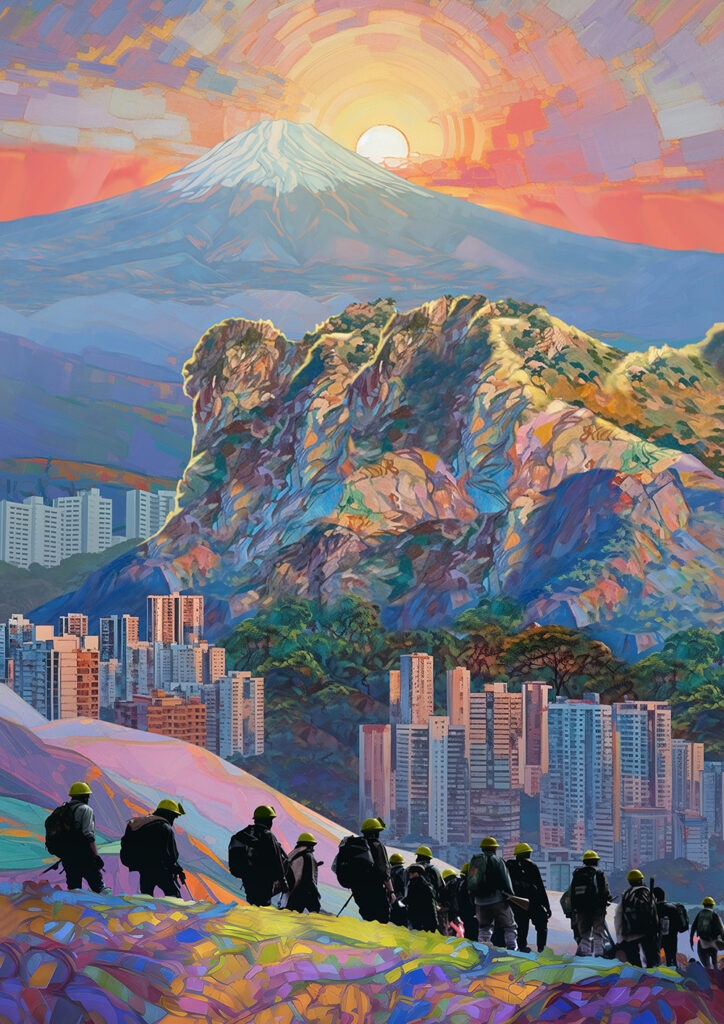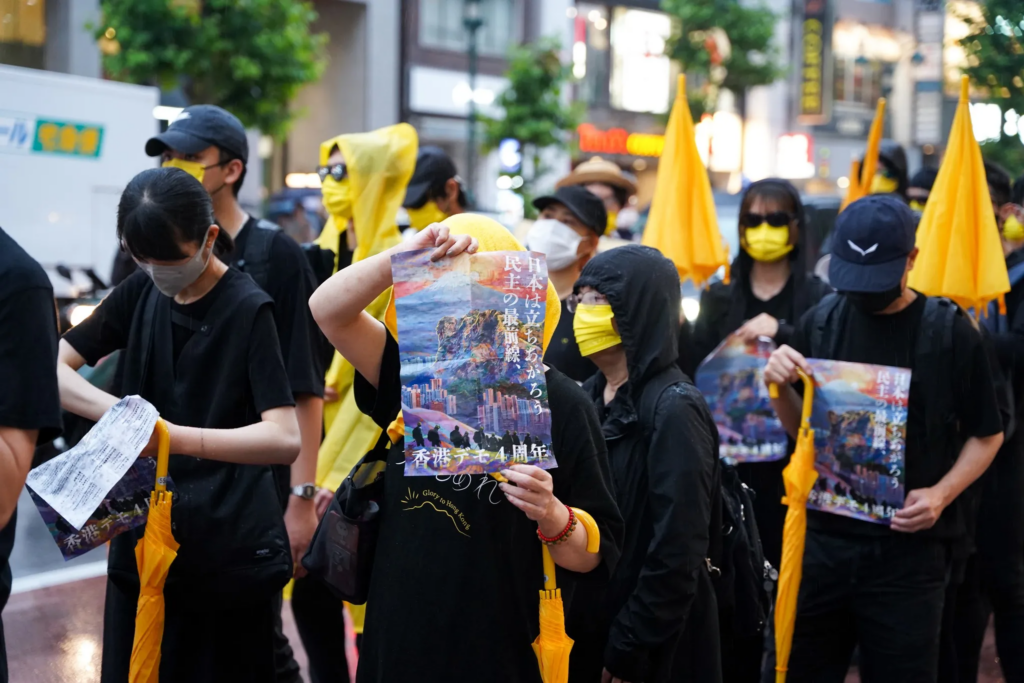In this interview series, we get to know the 2024 Freshwater Fellows—a cohort of nine human rights leaders working with the Freshwater Institute to develop alternative revenue streams for human rights initiatives in East Asia. We want to know how they got their start in human rights work, the challenges they face, and what they do to relax and stay optimistic.
Our first interview is with Alric Lee, co-founder of Lady Liberty Hong Kong. Alric spoke with Freshwater Institute’s Shawn Shieh and Wan-Ling Cheng while he was visiting Taipei in early December 2023 to organize the first Hong Kong Liberty Art Prize Exhibition.

- Tell us about yourself. How did you start working in human rights?
I didn’t have any direct human rights experience until 2019 when I got involved in the Hong Kong democracy movement. I was living in Japan at the time and made a trip to Hong Kong, where I saw news of protestors bringing out a replica of the Goddess of Democracy statue from the 1989 Tiananmen protests in Beijing. I thought it strange that these protestors were using a symbol from China to promote Hong Kong’s identity. As an architect, I thought I could contribute to the movement by proposing a Hong Kong version of the Goddess of Democracy based on the figure of a Hong Kong protestor.
I was going to extend my stay in Hong Kong for a week to create this statue but ended up staying three months. We wanted to be democratic about the process of creating the statue, so we asked netizens to submit their designs to be voted on in a competition. We received 16 submissions and ended up selecting nine to be voted on. Over 6,600 votes were cast, and the winning entry received around 3,000 votes.
Around this time, we were joined by several other volunteers who became the core of our team. One of them, a public relations person, suggested the name Lady Liberty Hong Kong (the Chinese name 香港民主女神is translated as Hong Kong Lady of Democracy) so that’s how we got our name. We wanted the name to reference the Statue of Liberty in New York.
- Freshwater Institute is supporting civil society leaders to develop innovative human rights projects. Can you tell us how your project came about?
We started this as a sculpture project and never thought about how we’d develop it, but we were encouraged by Hong Kongers involved in the protests. We began thinking about how we could use art to keep up the morale of the people and maintain unity and solidarity among people in Hong Kong and the Hong Kong diaspora. We wanted our project to serve as a voice for those who had no voice because they were imprisoned or in hiding. We wanted to serve as cultural ambassadors for Hong Kong people.
Toward the end of 2019, we began carrying out charitable fundraising by producing smaller versions of the Lady Liberty Hong Kong statue here in Taiwan and selling them. The income we generated was used to support our operations and promote the narratives, influence and solidarity of Hong Kong pro-democracy groups and activists on the international stage. We priced the statuettes at HK$600 (about $77 USD) and have sold around 10,000 of them over the last four years, raising a total of over HK$5 million (about $640,000 USD).
The passage of the Hong Kong National Security Law in June 2020 led to a significant decline in our sales as Hong Kong residents, who formed our main customer base, became increasingly nervous about buying our products.
In addition to the Lady Liberty statuettes, we also produced other artwork made by Hong Kong artists and auctioned them online. One of those pieces of art was auctioned for almost HK$100,000 (about U.S.$13,000).
In the early years, about 80 percent of the artwork was bought by Hong Kong residents, but with the decline of Hong Kong buyers after 2020, that portion has gone down to around 50 percent, with the other half coming from buyers in the United Kingdom, Canada, U.S., and Australia.

- What are some of the challenges you face in this project and in your work in general?
The logistics have been a nightmare. Local logistics partners in HK closed one by one, which means we’ve had to find new partners. To make things worse, our logistics partners in Taiwan have been violating their contracts by doubling their fee while our goods are in storage. COVID exacerbated the situation by disrupting the shipping and driving costs up. We’ve lost a lot of money having to pay for unexpected expenses. Now that the pandemic is less severe, the situation has gotten a bit better. Sometimes, we’ll take the goods with us when we travel to save on shipping costs.
Language is an additional challenge since we need to have everything prepared in three languages – the Chinese used by Cantonese speakers, the Chinese used in Taiwan, and English.
With all these logistical challenges, we’ve been thinking about moving to digital products.
- How has Freshwater Institute’s Human Rights Accelerator Program been helpful to you?
The May workshop was the first time we had a systematic way to think about our project’s development. (Editor’s note: the May 2023 Civil Society Innovation Lab was the first Freshwater workshop that brought together human rights groups from Taiwan, Hong Kong, and China to explore different business and fundraising models.) It helped us to organize our thoughts about our business model into different parts that could be tested to see what has been working and what needed to be changed. For example, we were doing a lot of social media posts, but this turned out not to be an effective way to reach potential customers.
It also helped us think about different categories of customers and a new revenue model developing digital artwork available on a subscription basis to reach new customers. These are things we’d never thought about before. We only thought we would serve Hong Kong customers, but the Human Rights Accelerator Program encouraged us to consider other customers and partners such as institutional funders, galleries, universities, media, and academics.

The workshop was also the first opportunity we had after the pandemic to interact face to face with other groups working on similar issues, particularly the Hong Kong groups. It was the first time we came in touch with Taiwan groups who told us they knew about us and said our symbol for Hong Kong resonated in Taiwan. Their support gave us more confidence to move forward.
One of the Taiwan groups in the Human Rights Accelerator program – the Judicial Reform Foundation – has been particularly supportive. JRF is co-sponsoring the art exhibition we are holding now in Taipei and has helped connect us with other Taiwanese partners.
We’ve been thinking about creating paintings for different events such as protests supporting Hong Kong democracy in Japan. When we showed our painting to people, they asked if they could download it for their own use. That was the first time we realized people were interested in our digital products. We opened a Patreon account and asked our supporters to consider signing up for monthly subscriptions so that they could receive new digital art works that they could use in their phones and computers.
To raise more awareness, we decided to hold an art prize competition to invite artists from around the world to create art in different categories – photography, 3-D art, multimedia, and literature – in support of the Hong Kong democracy movement. The theme of this year’s competition is Glory to Hong Kong which is the title of an anthem that came out of the 2019-20 protests in Hong Kong. Participating artists gain recognition and we gain their loyalty and the copyrights to their artwork which we then sell. Part of the proceeds from the sale of the art go to the artist, and the rest supports the Hong Kong cause.
The response to our competition was better than we expected with 42 artists participating and over 13,000 people voting. The winning entry received 3,300 votes. We now hope to build something similar to a Nobel Prize for art in support of Hong Kong democracy.

- If there is one thing you wish people could know about the issue you work on, what would that be?
We’d like to use art as a tool to create awareness and support for freedom and democracy in Hong Kong, and to send a message that the Chinese government is only as powerful as we want it to be. We want to send a message that art and creativity more generally – as an outlet for self-expression—can be a way for us to gain back the agency and power that the Chinese authorities are trying to take away from us.
- What keeps you motivated?
I’ve been so busy and focused on dealing with our challenges, and worried about the future. So I find it helpful if I can stay focused on the moment, staying in the present, reflecting on my own thoughts and on the journey itself, as a way to stop worrying about the future, about what the Chinese authorities will do, about what will happen to Hong Kong.
- What is something you do for fun or to relax?
I like going to a café and thinking about nothing. I don’t like to think too consciously about trying to relax because that in itself can be stressful. Sometimes I enjoy taking a walk, moving my body, as a way to relax.
- Thinking of the human rights issue you are working on, what would success feel like to you? What would make you feel like it was all worth it?
Success to me would be if Hong Kong people could get their power back so that they could live freely and without fear.

思流學院人權加速器參與者系列專訪:香港民主女神李伊東
在這個系列專訪中,我們將介紹思流學院 2023-24人權加速器計劃參與者,這9位人權領袖與思流學院合作,為東亞人權倡議活動開發新型態收入來源。我們想了解他們如何開始從事人權工作、他們所面臨的挑戰,以及他們如何放鬆身心並保持樂觀。
我們第一個專訪對象是香港民主女神共同創辦人李伊東。李伊東於2023年12月來到台北籌辦首屆香港自由藝術獎展覽,並與思流學院的謝世宏和鄭婉伶進行談話。

- 可不可以和我們聊聊,你是如何開始從事人權工作的?
在2019年參與香港民主運動以前,我並沒有任何和人權直接相關的經驗。當時住在日本的我去了一趟香港,看見示威民眾拉出1989年北京天安門事件中的民主女神雕像的複製品,我當時覺得奇怪的是,這些示威民眾使用一個來自中國的象徵來維護香港的身份。我身為一名建築師,我認為我可以設計一個以香港示威民眾形象為基礎的香港民主女神,為民主運動做出貢獻。
我原本只打算在香港多停留一周來製作這個雕像,但最後卻多待了三個月。在創作雕像的過程中,我們也希望能保持民主,因此,我們向網友徵求設計稿進行評選,最後我們收到了16份投稿,從中選出9份進行投票,活動吸引了共計超過6,600張選票,獲勝作品獲得了約3,000張票。
此時,幾位志願者也加入了我們,成為團隊的核心。其中一位公關組員提議使用「香港民主女神」(英文名稱為 Lady Liberty Hong Kong)作為組織名,這就是我們的名字來源,我們借用了紐約自由女神像的英文名。
- 思流學院全力支持公民社會領袖發展創新的人權加速器計劃,你能說說你的計劃是如何開始的嗎?
這個計劃最初是一個雕塑計劃,我們從來沒想過該如何往下發展,但我們受到參與示威的香港民眾鼓勵,我們也開始思考如何利用藝術來維持這些民眾的士氣,維持香港和香港僑民之間的團結。我們希望我們的計劃可以為那些被囚禁或躲藏的人提供一個發聲的管道,我們想成為香港人的文化大使。
2019年末,我們開始進行慈善募款,透過出售在台灣製作的縮小版香港民主女神支持我們的營運,並持續在國際舞台上推動香港民主組織和倡議者的故事、影響力和團結。這些縮小版雕像的定價為600港幣(約為77美元),在過去四年中已售出約10,000個,共募得超過500萬港幣(約為64萬美元)。
然而,2020年6月通過的《香港國安法》導致我們銷售額大幅下降,因為我們主要的客戶群——香港居民對於購買我們的產品有越來越多的疑慮。
除了香港民主女神雕像外,我們還製作了其他香港藝術家創作的藝術品,並在網路上拍賣,其中一件藝術品的拍賣價格將近10萬港幣(約為1.3萬美元)。
初期大約80%的藝術品是由香港居民購買,但隨著2020年後香港買家減少,比例已經下降到約50%,另一半是來自英國、加拿大、美國和澳大利亞的買家。

- 總體而言,你在這個計劃以及你的工作中遇到了哪些挑戰?
物流是非常大的挑戰,我們在香港本地的物流合作夥伴一個接著一個停業,這表示我們必須尋找新的合作夥伴。更糟糕的是,我們在台灣的物流合作夥伴還違約,我們將商品存放在他們的倉庫時,他們直接將收費加倍。新冠疫情讓情況變得更糟,船運整個被打亂導致成本上升,我們不得不支付一些意料之外的費用,所以損失了一大筆資金。隨著疫情稍微減緩,情況也有所改善。我們有時會在旅行時隨身攜帶這些商品,以節省運輸成本。
語言是另外一個挑戰,因為我們所有文本都需要準備三種語言——粵語使用者習慣的中文、台灣人慣用的中文和英文。
物流所帶來的挑戰也讓我們開始考慮轉向數位商品。
- 思流學院人權加速器計畫對你什麼幫助?
五月的研討會讓我們有機會第一次系統性地思考我們計劃的發展, (編按:2023年五月的公民社會創新實驗室是思流學院首次聚集台灣、香港和中國的人權團體,一起探索不同商業和募款模式的研討會。)這次研討會幫助我們分析、拆解自己的商業模式,測試哪些部分有效,以及需要改變的地方。例如,我們曾在社群媒體大量發文,結果卻發現這並無法有效地觸及潛在客戶。
研討會還幫助我們思考不同類型的客戶群以及新的收入模式,例如:開發可供訂閱的數位藝術品以吸引新客戶,這些都是我們之前從未思考過的事。我們原本只打算服務香港客戶,但人權加速器計劃鼓勵我們拓展客戶群和合作夥伴,如:機構資助、畫廊、大學、媒體和學者。

這次研討會也讓我們在疫情後第一次與其他關注類似議題的團體面對面互動,特別是香港團體。這也是我們第一次接觸到認識我們的臺灣團體,他們說我們對香港的象徵也在台灣引起迴響,他們的支持給了我們更多繼續向前的信心。
人權加速器其中一個參與的台灣團體——司法改革基金會(下稱司改會)特別支持我們,司改會是我們台北藝術展的聯合贊助商,他們也介紹了其他台灣合作夥伴讓我們認識。
我們一直想為不同的活動創作繪畫,例如:在日本舉行的聲援香港民主示威的活動等。每當我們向別人展示這些畫作,他們總會問是否可以下載使用,這是我們第一次發現大家對我們的數位商品有興趣,因此,我們開設了一個 Patreon 帳戶,邀請支持者訂閱支持,如此一來,他們每個月也能收到新的數位藝術品,讓他們在手機和電腦上使用。
為了引起更多關注,我們決定舉辦一個藝術獎競賽,邀請來自世界各地的藝術家參加,創作支持香港民主運動的各式藝術作品——攝影、3D立體藝術、多媒體和文學。今年競賽的主題是《願榮光歸香港》,這是2019至2020年香港示威行動中的代表歌曲。參賽藝術家受到表揚,我們也獲得他們的信任和藝術品版權,再將藝術品出售。銷售藝術品的部分收益歸給藝術家,其餘部分則用來支持香港相關議題。
藝術獎競賽的迴響超出我們的預期,總共有42位藝術家參加,超過13,000人參與投票。優勝作品獲得了3,300票。現在我們希望設立類似諾貝爾獎的藝術獎,以支持香港的民主運動。

- 就你所關注的議題而言,如果你希望讓大家知道一件事,那會是什麼?
我們希望利用藝術作為工具,讓人們關注並支持香港的自由和民主,並傳達一個訊息:中國政府的權力僅取決於我們的意願,我們希望藉由藝術和創造力作為自我表述的出口,成為我們奪回中國當局試圖奪走的權力和代理權的途徑。
- 是什麼讓您持續保持動力?
我一直忙於處理眼前的挑戰,同時擔心著未來,如果我能專注於當下,反思自己的想法和過程本身,這會對我很有幫助,這是一種停止擔心未來、擔心中國當局的下一步,擔心香港未來的方法。
- 您做什麼才能放鬆或娛樂?
我喜歡去咖啡廳放空,我不喜歡太刻意地放鬆,因為這麼做本身可能就會帶來壓力。我有時也喜歡去散步,活動一下身體,藉此放鬆。
- 面對你正在處理的人權問題,怎麼樣對你來說算是成功呢?怎麼樣會讓你覺得一切都是值得的?
對我來說,如果香港人能拿回屬於自己的權力,並且能無所畏懼、自由地生活,這樣就算成功了。
